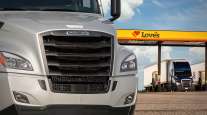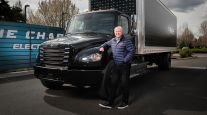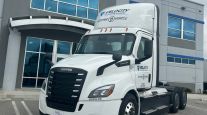Managing Editor, Features and Multimedia
DTNA’s Outgoing CEO Roger Nielsen Reflects on Industry’s Transformation
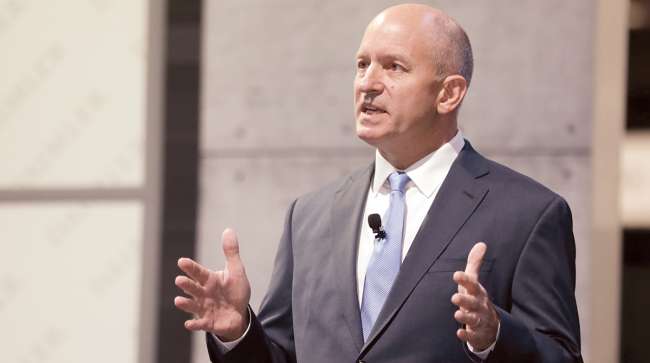
[Stay on top of transportation news: Get TTNews in your inbox.]
Roger Nielsen’s four years as CEO of Daimler Trucks North America coincided with a time of rapid change in the commercial vehicle industry, highlighted by the introduction of electric-powered trucks and the continued advance of automated driving and connected vehicle technologies.
“All of those things have evolved so fast in the last four years,” he said.
But this transition is still just beginning, according to Nielsen, who will retire from DTNA on April 30 after a 35-year career at the company, based in Portland, Ore.
John O’Leary, another DTNA veteran, will succeed Nielsen as CEO.
READ MORE: John O’Leary to Succeed Roger Nielsen as CEO of DTNA
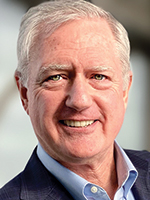
O’Leary
When Nielsen took the helm at DTNA in April 2017, the truck manufacturer was focusing on meeting tougher diesel exhaust emission standards in 2021, 2024 and 2027.
“We weren’t even thinking electric,” he said.
By June 2018, however, DTNA had introduced its all-electric Freightliner eCascadia and eM2 models. And today, the company and its fleet customers have deployed 38 of those vehicles, which have accumulated more than 500,000 miles in real-world freight operations.
“That’s how fast this transformation is going now,” Nielsen said during an interview with Transport Topics on Feb. 17. “We’re going to see the same thing in autonomous. We’re going to see the same thing in hydrogen fuel cells. It’s going to go faster than we ever would have imagined.”
Nielsen mentioned a recent conversation with a national truck stop operator about how to establish a hydrogen fueling network to support fuel cell electric trucks in the future.
“Those kind of conversations are something I never could have imagined when I first started at the company 35 years ago,” he said.
Nielsen envisions a place for both hydrogen fuel cell technology and battery-electric trucks in the years ahead.

Mergers and acquisitions have reshaped the trucking technology sector over the past decade, but what does this trend mean for the trucking and logistics companies that rely on these technologies? Seth Clevenger speaks with James Langley of Trimble Transportation. Hear a snippet, above, and get the full program by going to RoadSigns.TTNews.com.
“We think that battery-electric is definitely going to be the powertrain of choice going into the next decade for mid-range and for a portion of the heavy-duty range, but for the longhaul, irregular route truck driver, I think the future there is an electric powertrain energized by hydrogen fuel cell stacks,” he said.
Daimler Trucks and rival truck maker Volvo Group have agreed to form a joint venture to develop fuel cell systems for heavy-duty trucks.
Even as DTNA pursues next-level technologies, the basics of customer service remain paramount.
Looking back at his time as CEO, Nielsen said he is most proud of the company’s initiatives to make customer experience a top priority for everyone across the organization, from sales and service to accounting and information technology.
Today, DTNA’s goal is to quickly resolve a customer’s problem through a single point of contact, whether the issue is parts availability, vehicle repairs or invoicing.
“I feel really good that we have got everybody focused on that, and everybody understands that you are only one or two degrees away from the customer, regardless of what you do inside this company of 23,000 people,” Nielsen said.
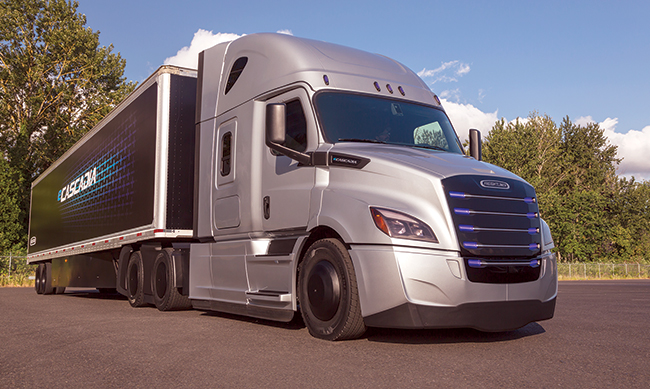
A Freightliner eCascadia. (Daimler Trucks North America)
He also touted DTNA’s introduction of increasingly advanced driver-assist capabilities, including Detroit Assurance 5.0 with lane departure protection and lane keeping assistance features, which received best transportation technology honors at the 2019 CES technology show.
At the same time, DTNA has continued its pursuit of higher levels of automated driving. In March 2019, Daimler Trucks acquired a majority stake in autonomous vehicle developer Torc Robotics. The truck maker also has partnered with Google sister company Waymo to produce self-driving trucks.
All of that is a far cry from when Nielsen began his career in 1986 as a Freightliner engineer responsible for wiring harness testing.
“I started out at the lowest level engineer you could imagine, but I had a lot of great opportunities over the years,” he said.
During the course of his career at DTNA, Nielsen held management roles in manufacturing and supply-chain management, and was chief operating officer from 2001-2016.
Meanwhile, DTNA expanded its business significantly. Back in 1986, the company had just 13% market share, Nielsen said, but DTNA grew over the years and eventually emerged as the North America’s market share leader in the medium- and heavy-duty truck segment.
“I’ve been around for 3.9 million of the 4.1 million trucks that we’ve built in America since 1936,” Nielsen said. “It’s been a great ride.”
Want more news? Listen to today's daily briefing below or go here for more info:


